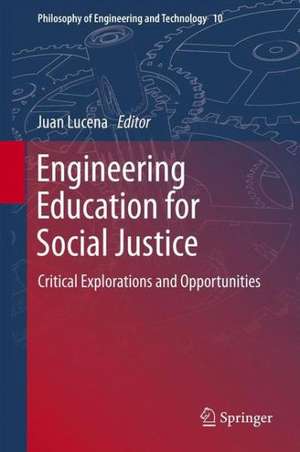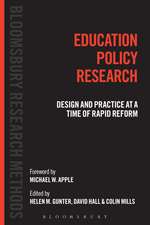Engineering Education for Social Justice: Critical Explorations and Opportunities: Philosophy of Engineering and Technology, cartea 10
Editat de Juan Lucenaen Limba Engleză Hardback – 5 iun 2013
This book aims to serve as a framework for interventions or strategies to make social justice more visible in engineering education and enhance scholarship in the emerging field of Engineering and Social Justice (ESJ). This creates a ‘toolbox’ for engineering educators and students to make social justice a central theme in engineering education.
| Toate formatele și edițiile | Preț | Express |
|---|---|---|
| Paperback (1) | 640.55 lei 6-8 săpt. | |
| SPRINGER NETHERLANDS – 24 iun 2015 | 640.55 lei 6-8 săpt. | |
| Hardback (1) | 646.75 lei 6-8 săpt. | |
| SPRINGER NETHERLANDS – 5 iun 2013 | 646.75 lei 6-8 săpt. |
Din seria Philosophy of Engineering and Technology
-
 Preț: 378.64 lei
Preț: 378.64 lei - 15%
 Preț: 662.95 lei
Preț: 662.95 lei -
 Preț: 280.88 lei
Preț: 280.88 lei - 20%
 Preț: 551.31 lei
Preț: 551.31 lei - 24%
 Preț: 806.73 lei
Preț: 806.73 lei - 18%
 Preț: 1110.86 lei
Preț: 1110.86 lei - 15%
 Preț: 639.23 lei
Preț: 639.23 lei -
 Preț: 392.97 lei
Preț: 392.97 lei - 18%
 Preț: 958.07 lei
Preț: 958.07 lei - 15%
 Preț: 645.28 lei
Preț: 645.28 lei - 15%
 Preț: 644.63 lei
Preț: 644.63 lei -
 Preț: 394.12 lei
Preț: 394.12 lei -
 Preț: 393.52 lei
Preț: 393.52 lei - 15%
 Preț: 638.90 lei
Preț: 638.90 lei - 15%
 Preț: 660.04 lei
Preț: 660.04 lei - 15%
 Preț: 654.43 lei
Preț: 654.43 lei - 15%
 Preț: 646.43 lei
Preț: 646.43 lei - 18%
 Preț: 788.90 lei
Preț: 788.90 lei - 15%
 Preț: 646.75 lei
Preț: 646.75 lei -
 Preț: 370.49 lei
Preț: 370.49 lei -
 Preț: 387.78 lei
Preț: 387.78 lei - 18%
 Preț: 735.07 lei
Preț: 735.07 lei - 18%
 Preț: 956.18 lei
Preț: 956.18 lei - 15%
 Preț: 637.59 lei
Preț: 637.59 lei - 18%
 Preț: 1009.40 lei
Preț: 1009.40 lei - 18%
 Preț: 787.91 lei
Preț: 787.91 lei - 15%
 Preț: 638.89 lei
Preț: 638.89 lei - 20%
 Preț: 566.75 lei
Preț: 566.75 lei - 18%
 Preț: 725.43 lei
Preț: 725.43 lei
Preț: 646.75 lei
Preț vechi: 760.88 lei
-15% Nou
Puncte Express: 970
Preț estimativ în valută:
123.75€ • 129.21$ • 102.42£
123.75€ • 129.21$ • 102.42£
Carte tipărită la comandă
Livrare economică 05-19 aprilie
Preluare comenzi: 021 569.72.76
Specificații
ISBN-13: 9789400763494
ISBN-10: 9400763492
Pagini: 296
Ilustrații: VI, 290 p.
Dimensiuni: 155 x 235 x 22 mm
Greutate: 0.59 kg
Ediția:2013
Editura: SPRINGER NETHERLANDS
Colecția Springer
Seria Philosophy of Engineering and Technology
Locul publicării:Dordrecht, Netherlands
ISBN-10: 9400763492
Pagini: 296
Ilustrații: VI, 290 p.
Dimensiuni: 155 x 235 x 22 mm
Greutate: 0.59 kg
Ediția:2013
Editura: SPRINGER NETHERLANDS
Colecția Springer
Seria Philosophy of Engineering and Technology
Locul publicării:Dordrecht, Netherlands
Public țintă
ResearchCuprins
Chapter 1. Juan Lucena; Introduction.- Part I. Where Have We been? Where Can We Go?.- Chapter 2. Dean Nieusma; Engineering, Social Justice and Peace: Strategies for Educational and Professional Reform.- Chapter 3. Donna Riley; Power. Systems. Engineering. Travelling lines of Resistance in Academic Institutions.- Part II. Conceptual Contributions to ESJ.- Chapter 4. Erin Cech; The (Mis)Framing of Social Justice: Why Ideologies of Depoliticization and Meritocracy Hinder Engineers’ Ability to Think About Social Injustices.- Chapter 5. Marisol Mercado-Santiago; What can Buddhism offer to a socially just engineering education?.- Chapter 6. Ryan Campbell; Caring in engineering: How can engineering students learn to care? How can engineering faculty teach to care?.- Part III. What gets in the way and how can ESJ live in the engineering classroom?.- Chapter 7. Caroline Baillie and Rita Armstrong; Crossing Knowledge Boundaries and Thresholds: Challenging the Dominant Discourse Within Engineering Education.- Chapter 8. Jen Schneider and Junko Munakata-Marr; Connecting the “Forgotten”: Transportation Engineering, Poverty, and Social Justice in Sun Valley, Colorado.- Chapter 9. Jon Leydens; Integrating Social Justice into Engineering Education from the Margins: Guidelines for Addressing Sources of Faculty Resistance to Social Justice Education.- Part IV: What Social Justice place in the world of engineering practice has to offer to engineering education.- Chapter 10. Andres Valderrama; What can engineering systems teach us about social (in)justices? The case of public transportation systems.- Chapter 11. Richard Arias; Exceptional Engineering: Challenges and opportunities for socially just engineers in NGOs.- Chapter 12. Nicholas Sakellariou; A framework for social justice in Renewable Energy Engineering.- Chapter 13. Juan Lucena; Conclusion.
Textul de pe ultima copertă
Hoping to help transform engineering into a more socially just field of practice, this book offers various perspectives and strategies while highlighting key concepts and themes that help readers understand the complex relationship between engineering education and social justice. This volume tackles topics and scopes ranging from the role of Buddhism in socially just engineering to the blinding effects of ideologies in engineering to case studies on the implications of engineered systems for social justice.
This book aims to serve as a framework for interventions or strategies to make social justice more visible in engineering education and enhance scholarship in the emerging field of Engineering and Social Justice (ESJ). This creates a ‘toolbox’ for engineering educators and students to make social justice a central theme in engineering education.
This book aims to serve as a framework for interventions or strategies to make social justice more visible in engineering education and enhance scholarship in the emerging field of Engineering and Social Justice (ESJ). This creates a ‘toolbox’ for engineering educators and students to make social justice a central theme in engineering education.
Caracteristici
Key strategies to introduce social justice into engineering education Case studies and examples of non-traditional places (e.g., NGOs, poor communities) for engineers to intervene in social justice and of traditional places (e.g., thermodynamics class, transportation systems) where engineers do not consider social justice as a significant dimension Brings together perspectives of scholars from a wide range of universities, teaching and researching at the intersection of engineering and social justice ?











